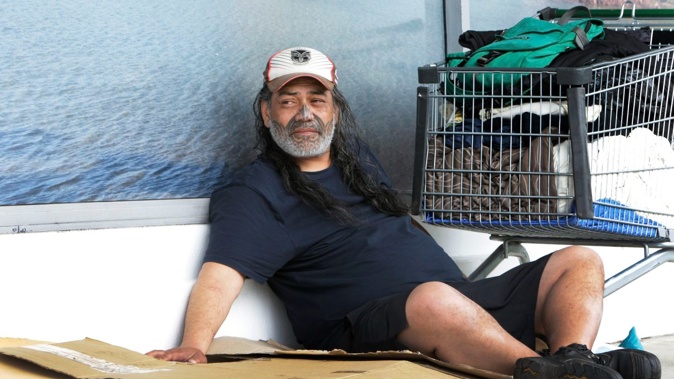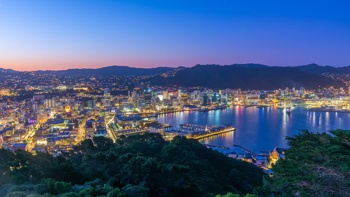
A job-ending back injury and a determination to escape a violent home thrust Whangārei man Jason Poutai out on the streets.
And now the 49-year-old lives in a pop-up tent tucked to the side of a downtown footpath, trying to read the body language of passersby to see whether they are friend or foe.
He is one of more than a thousand people in Northland looking for a place to call home.
According to Ministry of Housing and Urban Development data, 1114 people in the region were in need of public housing as of March 31. Demand was highest in Whangārei (557 applicants), followed by the Far North (480) and Kaipara (77).
But a community advocate says figures fail to reflect the true scale of homelessness, tipped to worsen as everyday costs stay high.
Poutai has taken the rare and brave step to put himself and his story out there. He wants to curb the judgment rough sleepers face.
Many homeless people were too ashamed to go public, he said.
The streets of Whangārei have not always been Poutai’s home. He used to work as a shearer, during which time his boss introduced him to the world of rodeo, where he loved riding the bulls and horses.
“It’s rougher on the streets than it is on the back of a bull,” he said.
Then one day, he hurt his back while at work and everything stopped. An operation wasn’t enough to return him to the workforce. He is still plagued by pain.
“Sleeping on cardboard certainly doesn’t help.”
Another cruel twist was his life at home.
“The reason I wanted out of there was because the people that were there were smoking meth and I don’t. It just became too toxic, it became unhealthy and very violent.”
So Poutai walked away.
/cloudfront-ap-southeast-2.images.arcpublishing.com/nzme/BACOU2JIHNFNDMNK3ONIEZ5VI4.JPG)
“That’s how I ended up here,” his hand gestured to a shopping trolley, not quite full to the brim but still every possession he owns.
Poutai said a “real cluster of emotions” fills those living on the streets.
“I get a lot of anxiety, a bit of stress, a lack of sleep. It can be a bit hard on the memory.”
Sometimes a good sleep is all Poutai craves.
“The stress is from knowing that you don’t have a place to go home to.”
When Cyclone Gabrielle raged and the rain never seemed to stop falling in the months afterwards, Poutai and other rough sleepers sought shelter at the cinema carpark in Whangārei.
“It was the only dry place we could find at the time to sleep.”
Whangārei District Council (WDC) workers instructed the group to move but the downpours kept going, so they stayed put. Until they were trespassed.
WDC Planning & Development general manager Dominic Kula said the council receives fairly regular complaints about people appearing to camp or stay in their cars in public places, leaving an area dirty, or being noisy or anti-social.
Far North District Council compliance manager Rochelle Deane said they receive occasional complaints about related “nuisance issues”. Whereas in Kaipara, a district council spokesperson said they get no complaints about homelessness, despite knowing it exists in their area.
Both the Far North and Whangārei councils said they engage with government and community-based agencies that have the ability, resources and wraparound services to help those in need.
Among those supporting rough sleepers is 155 Whare Āwhina. Poutai was grateful for the organisation’s 155 Open Arms day centre in Whangārei. There he could eat breakfast and lunch, have a hot shower and just be himself for a moment, he said.
It is not often Poutai gets to be himself anymore. A person he said is happy-go-lucky and loves to go fishing.
But passersby who make snap judgments will not know that about him. The many people who show him kindness might.
“The amount of coffee I have drunk on the streets,” Poutai laughed.
Those acts of altruism are what give homeless people hope that their situation may change, he said.
“Come and have a talk. Come up and say hello and just have a conversation, get to know us.
“We’re just people just like everybody else. It’s just our circumstances are different. I can’t offer you a coffee though.”
A kōrero aside, Poutai said a night shelter in Whangārei would be life-changing for rough sleepers - especially given there are more homeless than people think.
“The reality is there are people sleeping in their cars, sleeping under bridges, women sleeping in their cars with their daughters. It can happen to anyone.”
155 Whare Āwhina chief executive Liz Cassidy-Nelson backed up Poutai’s claim.
“There are definitely more people on the streets and we anticipate that will get, I hate to use the word worse, but the numbers will increase without a doubt.
“It’s outrageous that Whangārei has this issue, absolutely outrageous.”
/cloudfront-ap-southeast-2.images.arcpublishing.com/nzme/RTOTGDKTVFFUROO4N365ZDZDU4.jpg) Liz Cassidy-Nelson says a growing number of people are feeling cost-of-living pressures heavily. Photo / Tania Whyte
Liz Cassidy-Nelson says a growing number of people are feeling cost-of-living pressures heavily. Photo / Tania Whyte
She explained that a transient community of homeless people were returning to their Northland roots.
Homeless people have always been around but were no longer invisible, Cassidy-Nelson said.
“That brings a lot of sadness to us all in terms of no one should be sleeping on the streets in the cold or in their cars.”
To help, people can support services like 155 Whare Āwhina and He Korowai Trust in Kaitāia, among others.
“The thing is to not be judgmental,” Cassidy-Nelson said. “Say hello, say kia ora. Let’s bring the community back to being a place of connection. We are all equal.”
When it came to the possibility of a night shelter, she said the initiative had to be a Government and multiple-agency response as it involved complex individuals who need appropriate support.
“What we needed from the Government is really good intervention support. They need to invest in their local communities as communities know better ... that’s where the solutions lie really.”
Take your Radio, Podcasts and Music with you









